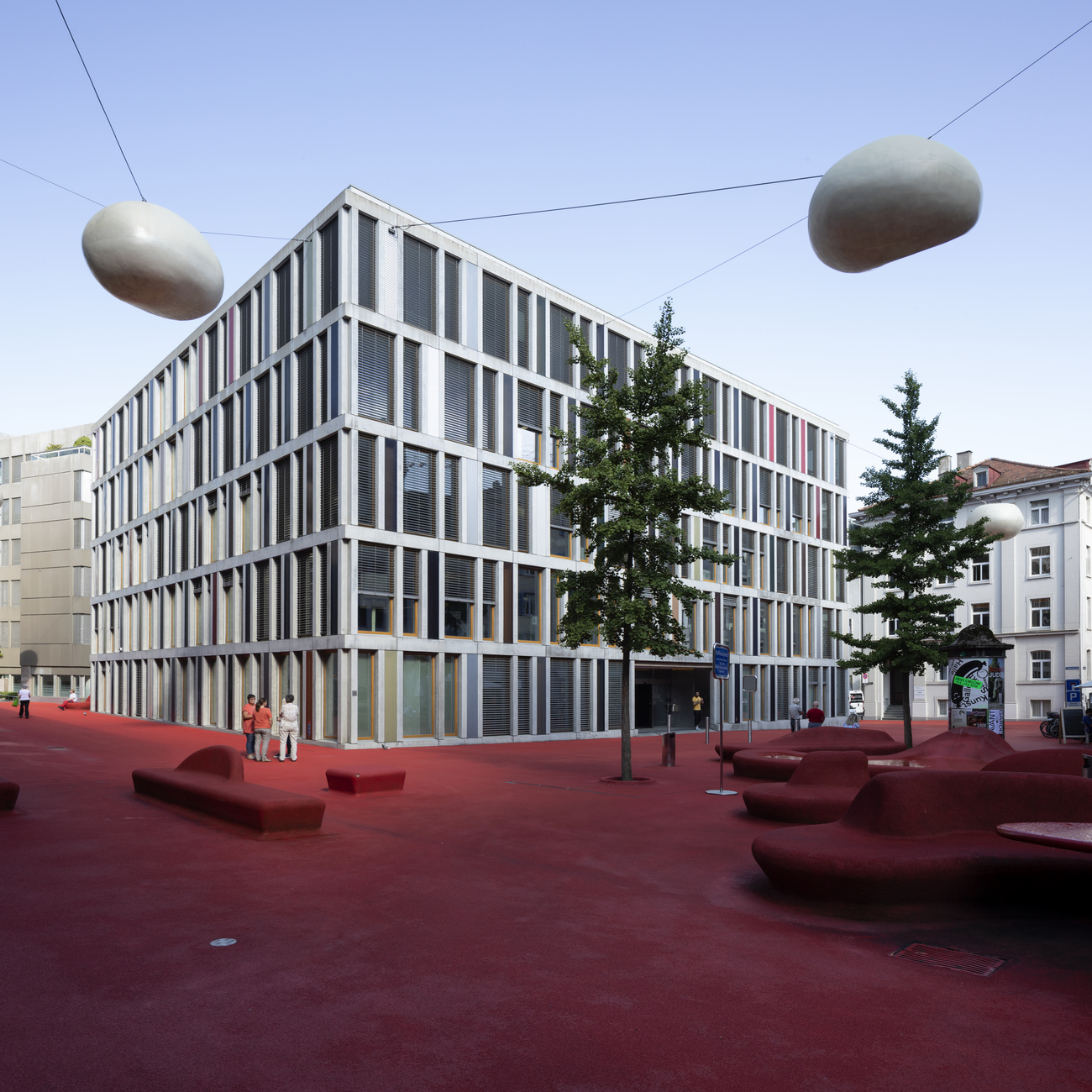
Anti-Semitism ‘played no role’ in Raiffeisen Switzerland bank business

The Raiffeisen banking group has no history of prejudicial business behaviour against Jews in Switzerland despite the anti-Semitic views of its German founder, according to a report that was commissioned by the company.
A presentation of the report’s findings by Raiffeisen Switzerland on Thursday also addressed protests about the naming of the Raiffeisen square next to the bank’s headquarters in St Gallen.
A public square in the Bleicheli neighbourhood of St Gallen has been known as Raiffeisenplatz since 2005. It is surrounded by Raiffeisen Switzerland buildings. Designed by the artist Pipilotti Rist, the square is striking, with an all-red pavement surface; its unofficial name is therefore “Red Square”. The St Gallen synagogue is located on the square’s edge.
In May 2023, a committee publicly criticised the naming of the square, claiming that Raiffeisen’s founder in Germany, Friedrich Wilhelm Raiffeisen, had been an anti-Semite. The name of the Jewish Holocaust-era refugee rescuer Recha Sternbuch was suggested as an alternative eponym.
Former Social Democratic senator Paul Rechsteiner, historian Stefan Keller and Rist were among those in favour of a change of name. At the time the suggestion was raised, Raiffeisen Switzerland pointed to ongoing research into its history, which encompassed the topic of anti-Semitism.
Not an anti-Semitic bank
The results of said research were presented at a media conference in St Gallen on Thursday. The main takeaway: “There was no evidence that anti-Semitism played a role in the banking business of the Swiss Raiffeisen organisations.”
This conclusion was reached by Gregor Spuhler, historian and head of the Archives of Contemporary History at ETH Zurich, and historian Verena Rothenbühler, each of whom examined different aspects of Raiffeisen’s history.
On the one hand, they focussed on the beginning of the movement in Germany and thus on Friedrich Wilhelm Raiffeisen (1818 – 1888). Spuhler explained that there had been a problem with sources and that a lot of material had been lost. However, an internal report written by Friedrich Raiffeisen around 1880 contained many anti-Semitic stereotypes.
Against Jewish usury
Around the same time, however, Friedrich Raiffeisen wrote a fundamental article on the “Jewish question” in which he distanced himself from the anti-Semitic rhetoric of the time. Spuhler described him as an “anti-Semite with contradictions”. The Raffeisen movement spread the narrative that its loan societies were an “instrument against Jewish usury”.
After some time, the banking group also gained a foothold in Switzerland. The first Raiffeisen credit union was founded in 1899 in Bichelsee, canton Thurgau. In the early days, the anti-Semitic founding narrative shaped in Germany was consolidated in Switzerland, it was announced at the media conference.
The first Raiffeisen credit unions were founded in rural Catholic areas and thus in a milieu in which anti-Semitic prejudices were widespread, explained Rothenbühler.
The researchers were given access to, among other things, the archives of 40 regional Raiffeisen banks. There they found no evidence that anti-Semitism played a role in their banking business. Rejections of loans were justified on economic grounds, and Jewish names were found in membership lists.
Renaming not necessary
The research report has now filled a gap, said Christian Hofer, who is responsible for sustainability, policy and the cooperative at Raiffeisen Switzerland. The Raiffeisen group distances itself from the anti-Semitic founding narrative, he said, which contradicts the values of the company and the cooperative.
Based on the report’s results, Hofer was of the opinion that the square could continue to be called Raiffeisenplatz, but noted that the city of St Gallen is responsible for naming streets and squares. The committee which called for the renaming almost a year ago has not yet responded to the findings of the report.
Adapted from German by DeepL/kc
This news story has been written and carefully fact-checked by an external editorial team. At SWI swissinfo.ch we select the most relevant news for an international audience and use automatic translation tools such as DeepL to translate it into English. Providing you with automatically translated news gives us the time to write more in-depth articles.
If you want to know more about how we work, have a look here, and if you have feedback on this news story please write to english@swissinfo.ch.

In compliance with the JTI standards
More: SWI swissinfo.ch certified by the Journalism Trust Initiative



























You can find an overview of ongoing debates with our journalists here . Please join us!
If you want to start a conversation about a topic raised in this article or want to report factual errors, email us at english@swissinfo.ch.